13 March 2023
Originally published
09 December 2022
Source
Poland’s far-right used to be loyal footsoldiers for the Catholic Church. But now, they are turning against the clerical establishment – by going to Latin mass.
The men are assembled along the left, the women line up along the right, and the very young children follow the proceedings from an anteroom, soundproofed behind a glass screen. The dress code is sombre – mostly black, occasionally grey. The women are obliged to cover their hair, though judging by the sprinkling of Louis Vuitton and Hermes headscarves, there is no injunction against luxury. Silent and perfectly still, the congregation surrenders to the language of the ancient church: “Gloria Patri, et Filio, et Spiritui Sancto”.
For the sermon, the priest switches from ecclesiastical Latin to everyday Polish. “You used to be so passionate about your faith and your national identity,” he says. “You paraded with your T-shirts of war heroes and sang hymns in praise of the Lord and the motherland. Now all that is gone. Why?” The reproach seems to be directed exclusively at the male members of the congregation. They lower their heads penitently.
Appeals to nation and faith are uttered in the same breath on Poland’s Independence Day, the annual holiday on November 11 that commemorates the restoration of the country’s sovereignty. However, the faith invoked at this Independence Day mass, in the leafy Warsaw suburb of Wawer, could not be further from the mainstream Catholicism that anchors Poland’s national identity.
The mass was held at a small chapel belonging to the Society of Saint Pius X, an organisation of Catholic priests that was established by Marcel Lefebvre, a controversial French archbishop who was excommunicated by no less a figure than Pope John Paul II, patron saint and supreme icon of modern Polish Catholicism. Performed in traditional Latin rather than Polish, the ceremony at Wawer contained deeply traditional elements that even the most conservative of Poland’s churchgoers might have found archaic. It was arranged at the behest of the Independence March Association, a Polish far-right organisation that convenes an annual march on Independence Day, rallying tens of thousands of ultra-nationalists to declare their hostility to “cultural Marxism” and LGBT rights while affirming – sometimes violently – their “patriotism” and “traditional” Polish values.
The head of the Independence March Association, Robert Bąkiewicz, is the most recognisable figure within Poland’s extra-parliamentary far-right, and the closest thing to a leader for its disparate formations. At the mass in Wawer, he could pass for the doorman of an upmarket nightclub – burly physique, smart grey overcoat, military-grade haircut. Contemplating the altar, he is periodically interrupted by uniformed lieutenants equipped with wireless earpieces and armbands.
Bąkiewicz – the name is pronounced “Bon-kyeh-vich” – is among the minority of Catholic traditionalists worldwide who prefer to attend mass in the original Latin rather than in their native languages, as is the norm. The traditionalists believe the mainstream Catholic way of worship has strayed from dogma and become too liberal, too ecumenical. As they see it, the Latin, or Tridentine, mass still preserves the splendour and sanctity of the pre-modern Church. In a later interview at his office, Bąkiewicz criticised the liberalised version of the rite that he grew up with. “It became like a spectacle of sorts, like a Protestant church… something infantile, something I could not take seriously,” he said.
On social media, the Latin mass is associated with the “trad Caths” – Anglophone internet-speak for an increasingly visible new generation of online Catholics. The “trad Caths” of Instagram and TikTok share content celebrating the values and aesthetics of traditional Catholicism, in tones that veer between the playful and the unabashedly sincere. Bąkiewicz has joined in the fun – his private Facebook profile has featured a meme-style portrait of himself with the slogan, “Latin Mass Matters” – but his “trad Cath” identity is also a political statement. It signifies a rejection of a historic ally, the Polish clerical establishment, and a recalibration of the far-right’s relationship with Church and state. It also underlines his own credentials. To lead the far-right, you must be more nationalist than the nationalists, and more Catholic than the Catholics. And there is no better way of demonstrating that, in today’s Poland, than by being seen at Latin mass.
Poland’s nationalists have traditionally been close allies of its Church leaders. Through Nazi occupation and Soviet dominance, they served as joint custodians of national identity, active in the resistance and in the preservation of Polish culture. Over the last decade however, the clergy has been hit by a series of scandals that have weakened its standing with the nationalists, as within Polish society at large, leaving it looking like the junior partner in its alliance with the right-wing government. Media reports have exposed the profligacy of Polish bishops who spent donations to the Church on expensive cars, real estate and lavish renovation schemes. More damagingly, senior clergy in Poland have been implicated in committing and covering up child abuse – allegations that echo those made against Catholic bodies across the world.
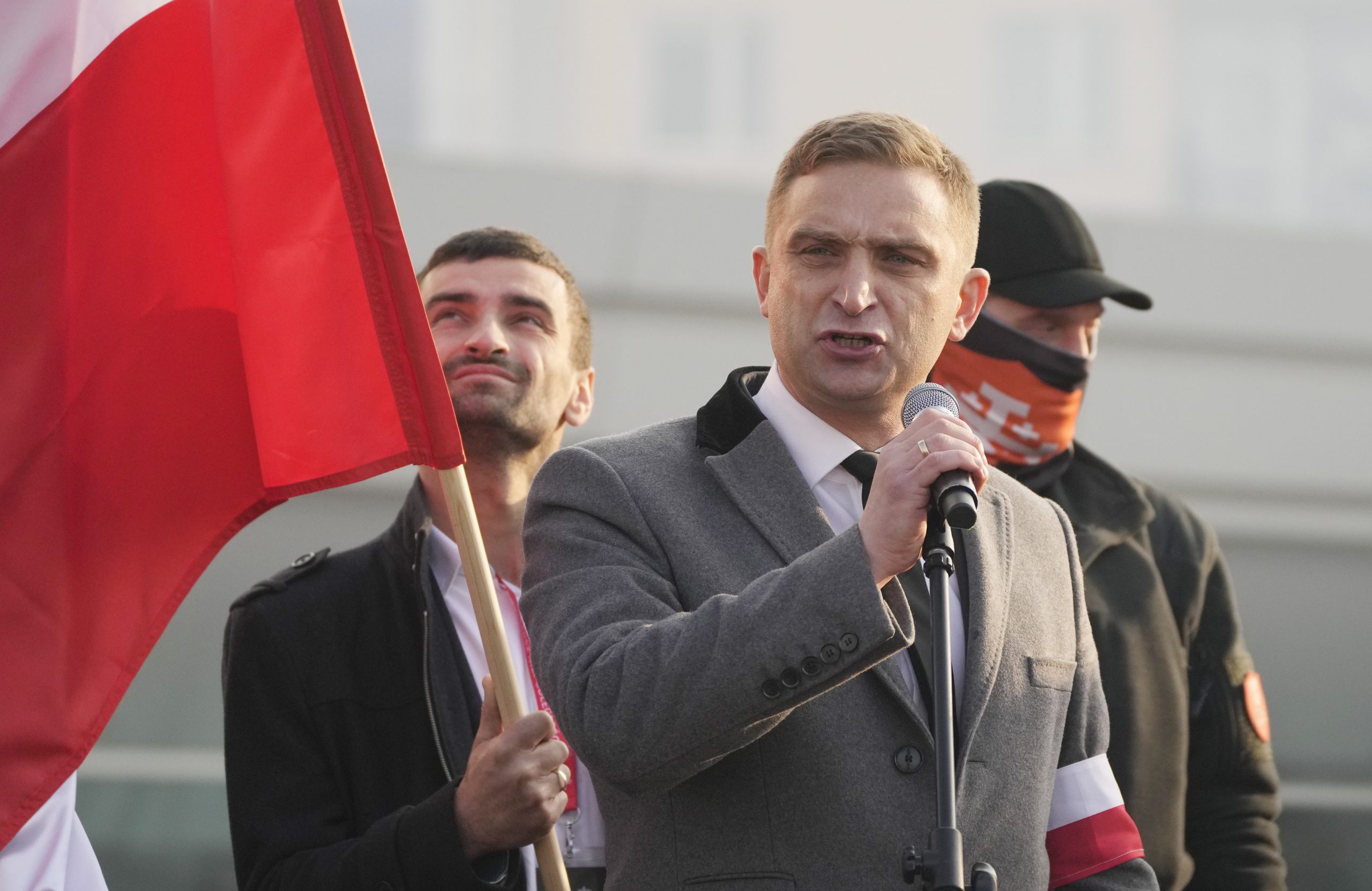
Robert Bąkiewicz is the most recognisable figure within Poland’s array of far-right formations. Photo: Czarek Sokolowski / AP / picturedesk.com
The scandals have prompted accusations that the clerical establishment has been behaving like an unaccountable elite, corrupted by power and privilege. Indeed, the far-right’s criticism of Church leaders has a distinctly populist tone, suggesting an archetypal contest between “everyday people” on the one hand and “elites” on the other. “I will send my men to protect churches,” Bąkiewicz told me in October 2020, as an effective ban on abortions ignited anti-clerical protests across Poland. “But I will never send them to protect the palaces of bishops.”
Matters have not been helped by the current pope. Hailed as a reformist by liberals, Pope Francis has irked conservatives in Poland and beyond, prompting many to question his judgement. Traditionalists have been particularly troubled by the Pope’s decision to restrict access to the Latin mass, reversing efforts by his predecessor, Pope Benedict, to restore some legitimacy to the ancient rite. Where the era of Pope John Paul II marked the consolidation of the relationship between Poland’s nationalists and clergy, the era of Pope Francis coincides with its weakening. “It’s not like we disobey the Pope, the hierarchs,” Bąkiewicz said. “But one cannot ever accept others preaching a false gospel, even if it is – to quote Saint Paul – an angel descended from heaven.”
Street-fighters with a political label
In the battle with liberal values, the far-right in Poland is broadly aligned with its government. Led by the national-conservative Law and Justice party, the government picks fights with Brussels, intimidates independent judges and journalists, demonises the campaign for LGBT rights, more or less prohibits abortions, and persecutes refugees and migrants unless they happen to be Ukrainian. Poland’s far-right movement supports these policies on the streets, and some of its biggest players – such as Bąkiewicz – are in turn supported financially by the government. Investigative journalists in Poland have revealed that the government has paid more than one million euros in public subsidies to organisations linked to Bąkiewicz. Much of the money is drawn from the budget for cultural projects, and is allocated towards staging the Independence March – an arrangement that casts Bąkiewicz in the role of subcontractor, providing event management services for a state that prefers its sponsorship of the far-right to be kept under wraps.
According to Mikołaj Cześnik, a political scientist and professor at Warsaw’s SWPS University of Social Sciences and Humanities, the government uses far-right figures such as Bąkiewicz to fly a kite for its most hardline policies. “You do not need an army to do that – a few people on the streets of Warsaw is enough,” he said. In the conflict with Brussels for instance, Cześnik said, the far-right helps the government to measure, foster and claim popular support for an extreme position. “The nationalists openly hate Brussels, the people hear that, and this allows the PM to come out and say that he is taking a tough stance against the European Commission because he values the Polish people over some foreign, cosmopolitan greater good.”
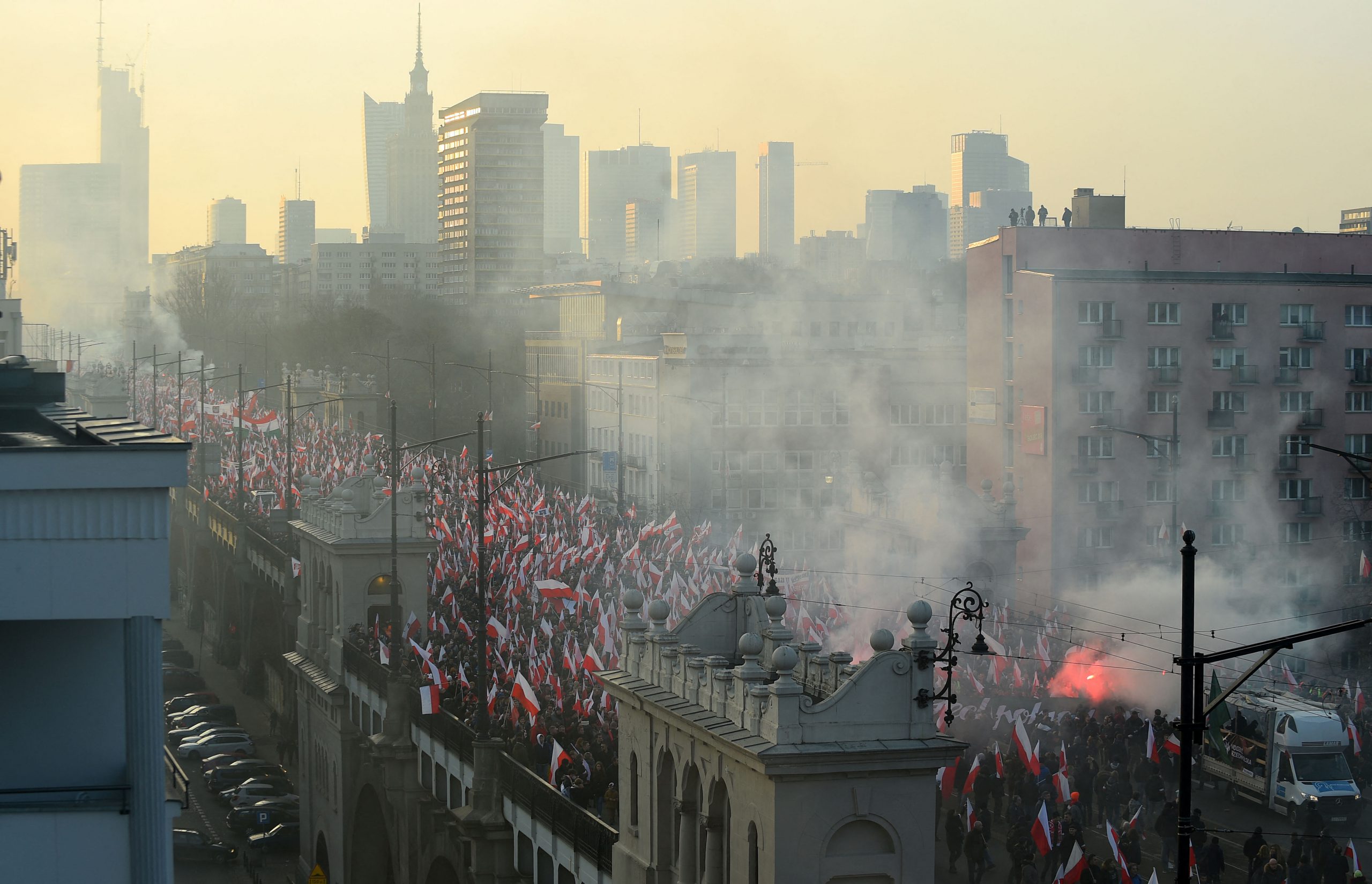
The annual Independence March in Warsaw has become a rallying point for far-right groups, as well as conservatives. Photo: Adam Chelstowski / AFP / picturedesk.com
Cześnik said he did not expect the Independence March Association to convert its influence into formal political clout by contesting elections as a party. “The threat of them achieving anything in a political sense is not significant,” he said, “and it is certainly much smaller than the threat of them committing harm to Polish public opinion.”
Bąkiewicz began his political career as a footsoldier in the ONR, the largest and oldest formation within Poland’s far-right eco-system. The ONR – its initials stand for National Radical Camp – claims to be the ideological heir to an organisation of the same name whose cadres hounded Poland’s Jews and leftists in the run-up to World War Two. The nationalist organisation took part in the armed insurgency against the Nazis, only to be driven underground by the Soviets. It re-emerged in the 1990s as a fringe movement, amounting at first to little more than a group of streetfighters with a political label. Its present-day membership is known for its Islamophobia, anti-Semitism and hostility to LGBT rights, as well as its belief in an ethnically pure Poland. A recent ruling by Poland’s supreme court decreed that the ONR could reasonably be described as “fascist”, although the court stopped short of endorsing that description. The movement rejects the label – fascism is technically outlawed in Poland – even if some of its members have been pictured marching in brown shirts and performing Roman salutes.
Bąkiewicz became known at the ONR for his rousing speeches and all-round tough guy image – qualities that, according to his supporters, have helped shake the far-right out of its anomie and restore its sense of purpose. He was born in 1976 in Pruszków, a satellite town of Warsaw that acquired a reputation for gangland violence in the post-communist transition. As a young man, he ran a small construction company. The Polish investigative website, frontstory.pl, revealed that the firm struggled financially, and that Bąkiewicz eventually filed for bankruptcy in 2011 – around the same time as he became active in the ONR. Media outlets also reported that he had been granted a divorce at around this time, with his financial problems cited as a contributory factor. Bąkiewicz has refused to speak to the press about this period in his life.
He agreed to the interview on condition that we would only discuss matters of faith. Questions about his financial history were strictly off-limits, and nor was I able to ask him about a 2017 interview in which he used a slur for gay people, and referred to homosexuality as an illness threatening the traditional family.
Persecution and exile
The interview took place in Bąkiewicz’s office, in a tower block in Warsaw’s genteel Żoliborz district. I waited in a hallway where religious icons hung on the wall. A stack of newspapers beside the chair contained a range of left and right-wing publications, many with handwritten comments scribbled on the front-page stories. Bąkiewicz tends to avoid speaking to established media outlets, opting to get his message across via his YouTube channel.
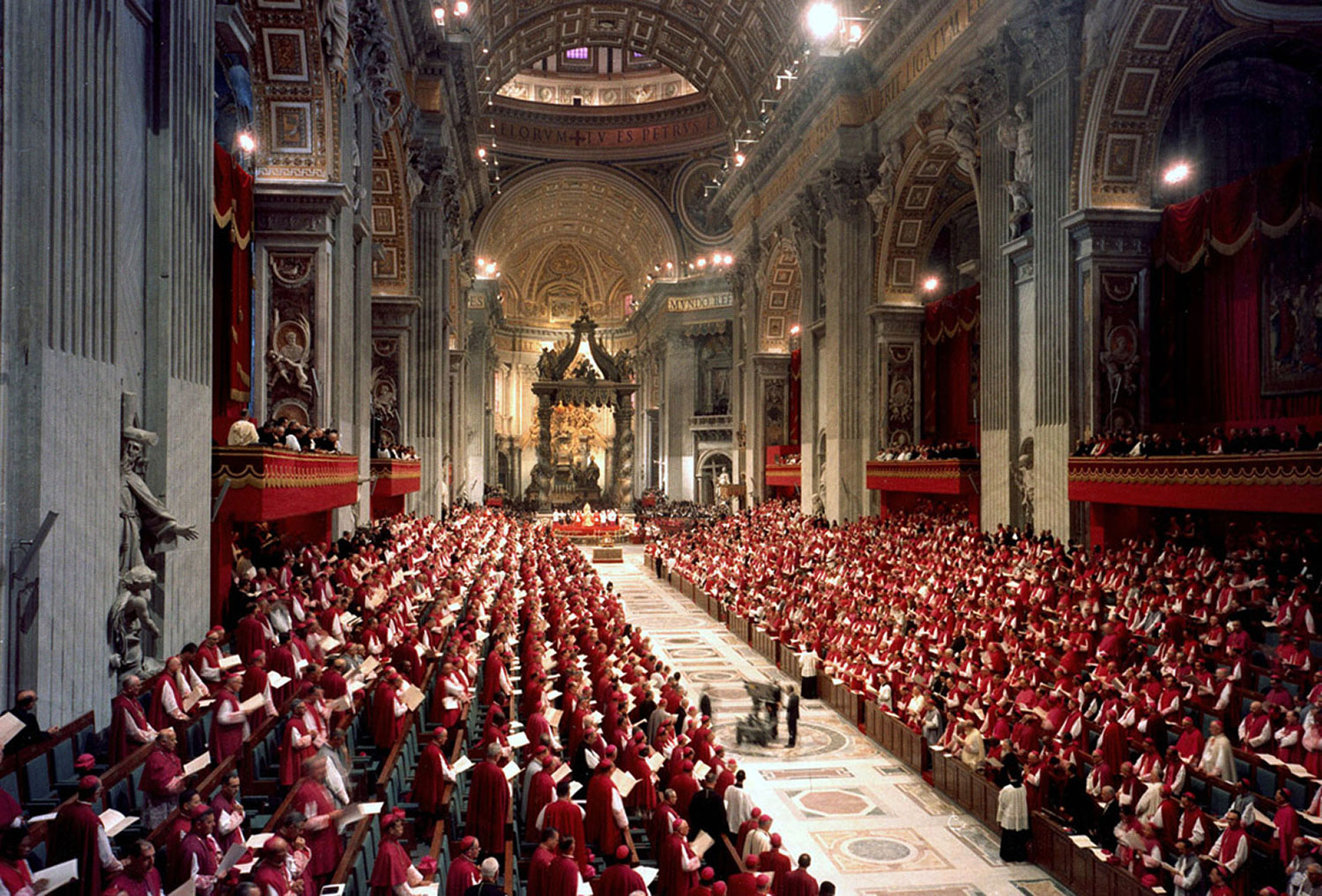
Catholic Church leaders from around the world debated wide-ranging reforms at the Second Vatican Council between 1962-1965. Photo: Catholic Press Photo / Wikimedia Commons
I began the interview by asking him about his enthusiasm for Latin mass. He responded that the modern mass, replacing the Latin version, undermined the Church’s claim to universality – the claim, in other words, that its teachings applied equally to everyone. “The Church cannot suddenly start changing what it used to preach,” he said, because universality also meant that the institution “needs to be understood in the same way.”
Almost all churches in Poland conduct the mass in the Polish language – a legacy of the Second Vatican Council, held in Rome between 1962-5. The extraordinary summit resulted in sweeping reforms that were welcomed by liberals as a timely overhaul of obsolete doctrine and ritual. Importantly, priests were permitted to celebrate mass in the native language of the congregation rather than Latin. Deeply conservative factions within the Church, however, rejected the changes. Some of these factions were eventually cast out by the Vatican.
The Society of Saint Pius X is among the leading formations that have been exiled to the margins of the mainstream faith. It was established in 1970 by Marcel Lefebvre, a French archbishop who had led opponents of the reforms at the Vatican Council. In 1988, Lefebvre was branded a schismatic and ex-communicated by the Vatican after he defied papal authority by personally consecrating three priests.
“I remember the Lefebvre movement as minnows, back in the 1990s,” said Stanisław Obirek, a former priest who lectures in American Studies at the University of Warsaw. “They were insignificant.” That changed, he said, as the movement began to attract prominent recruits in Poland, including an influential Jesuit priest and a popular right-wing historian. “People like that gave them recognition and legitimacy, and their optics became more attractive.”
Bąkiewicz’s wing of the far-right embraced the Lefebvre movement after falling out with the clergy three years ago. The bond was fortified a year later, amid the largest protests seen in Poland since the dying days of the communist regime. The targets of the protesters’ fury were the leaders of the governing coalition and their allies in the church, deemed to bear joint responsibility for a new law effectively banning abortions. Hundreds of thousands of people took to the streets for weeks on end, church services were interrupted by activists, and the word, “murderers”, was spray-painted on church facades across the country.
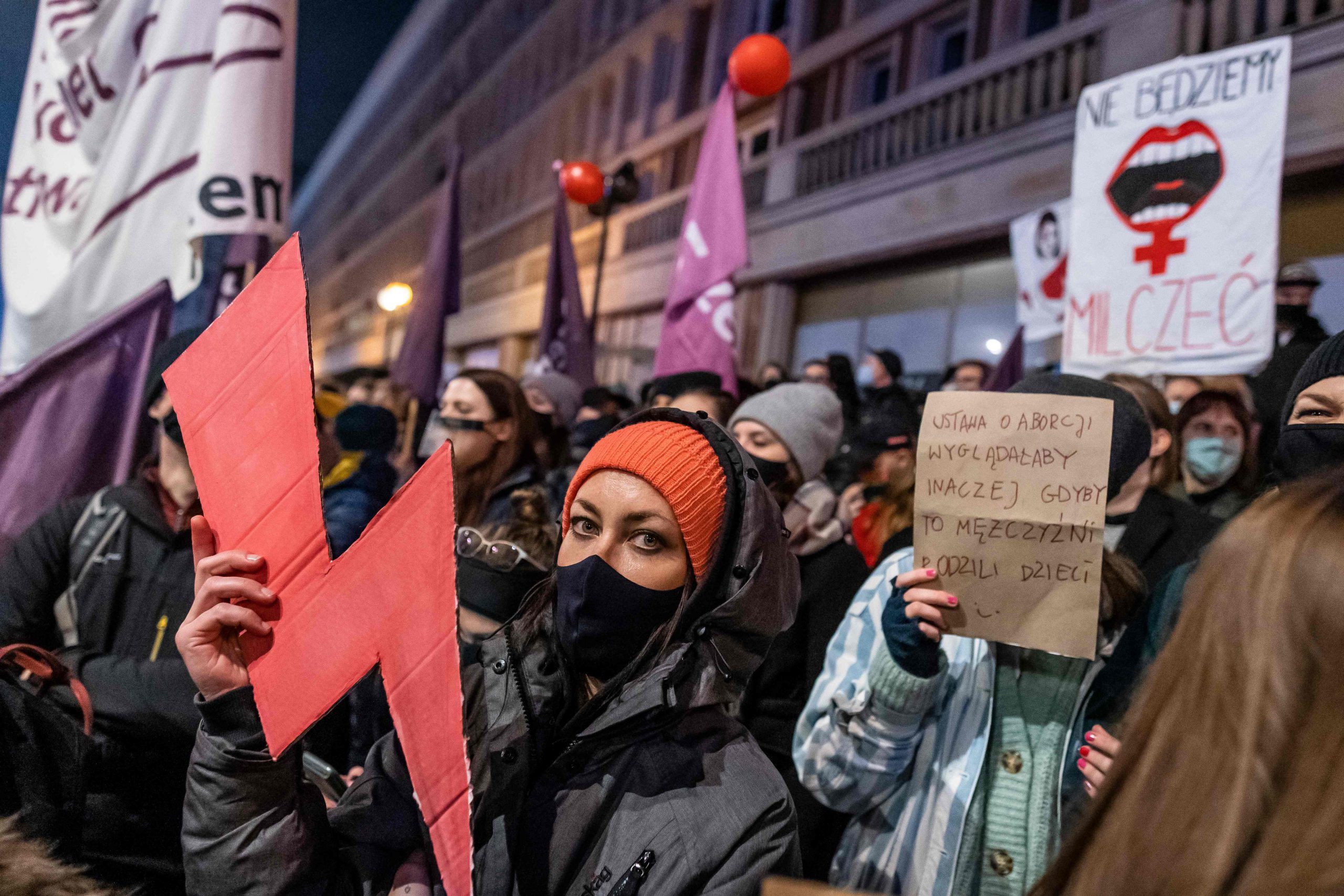
Tens of thousands of Poles took to the streets in 2020 to protest against a law that would severely restrict access to abortions. Photo: Wojtek Radwanski / AFP / picturedesk.com
The air of insurrection seemed to galvanise Bąkiewicz, spurring him to a defence of his values. “Out there on the streets right now, there are only two banners: the banner of Jesus and the banner of Satan,” he told me, when we spoke by phone on October 27, 2020. Later that day, he convened a press conference outside the St Cross Church on Warsaw’s iconic thoroughfare, Krakowskie Przedmiescie. He declared that he was creating a volunteer force of “true Poles” that would rise up against the danger of secularisation, and secure church premises against attack.
The clergy, though, was less enthusiastic about an association with the far-right. A year earlier, in the run-up to the 2019 Independence March, Bąkiewicz had tried to book a central Warsaw church to host a celebratory mass for his supporters. However, church after church turned him down. A vicar at a prominent Warsaw church who eventually agreed to host the mass would also cancel at the last minute, reportedly because Bąkiewicz had not disclosed his institutional affiliation when making the booking.
“I am disappointed that the Polish Church is not fighting for these souls.”
In a spat that was played out in the national press, Bąkiewicz in turn accused the Archbishop of Warsaw, Kazimierz Nycz, of violating canonical law by denying his request for a Latin mass. A spokesman for the Warsaw Archdiocese, Przemysław Śliwiński, rejected the accusation, telling me at the time that the decision had been taken by individual churches, and they were moreover under no obligation to host a Latin mass. And so it came to pass that the far-right leader spurned in Warsaw would end up celebrating mass at a small chapel in the suburbs, operated by a movement on the fringes of Catholicism.
The themes of persecution and exile resonate through the history of Christianity, echoing the suffering of the earliest followers of the faith. The modern far-right often exploits these themes, insisting that it has been victimised by crusading leftists and over-reaching governments. Bąkiewicz has portrayed his movement as heirs to the early Christians, combating the rotten elites in the name of the true believers – giving a populist spin to the old story.
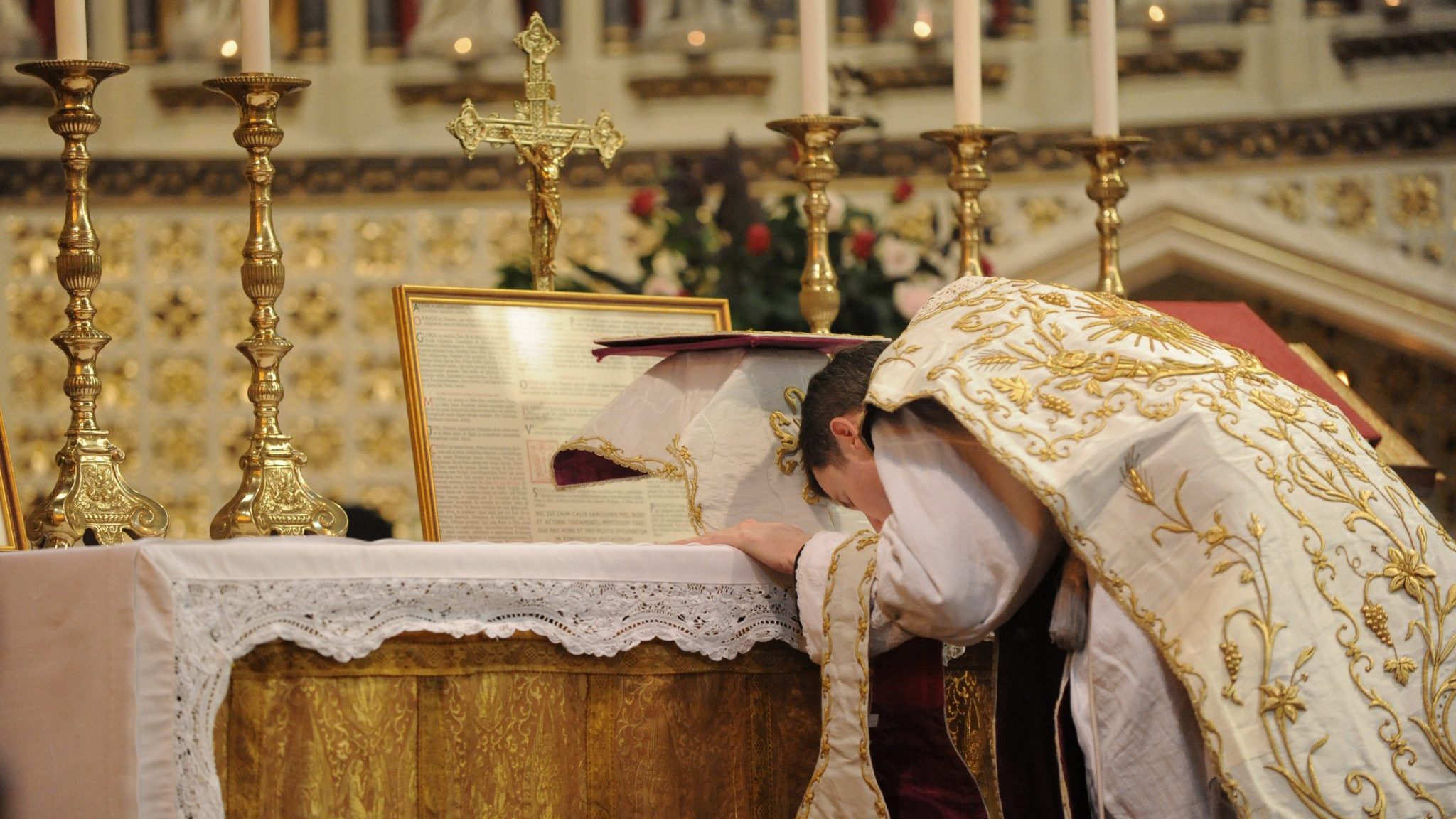
Traditionalist Catholics believe the Latin Mass preserves the sanctity and splendour of the pre-modern Church. Photo: catholicrelics.co.uk
As Bąkiewicz’s far-right follows the rising star of the Lefebvre movement, the Law and Justice-led government has entered an ever-tightening embrace with the Church. Top clerics have applauded the overall direction of Law and Justice’s rule, while priests in smaller cities have nudged the faithful to vote for government candidates – all the while endorsing the party’s stance on abortion and LGBT rights. The party’s growing influence over the judiciary has, critics say, also enhanced its appeal as a strategic partner for an institution facing a barrage of lawsuits over sex abuse claims.
Where the far-right flies a kite for Law and Justice ideologues in exchange for state subsidies, the Church clings to the government in the face of scandals and waning influence. Law and Justice is the dominant partner in both these relationships, the apex of a lopsided triangle, bestowing benefits as it chooses.
‘Lifeboats lowered from a sinking ship’
In the interview at his office, Bąkiewicz heaped scorn on the clergy that had barred his followers from its churches. He accused them of taking a passive stance during the protests against the abortion law, thereby neglecting a fundamental duty to stand up for the faith. “They suddenly went silent, they did not do what the Church expects them to do.” Instead, he said, “at moments like these, the Church, the bishops, the cardinals in particular, are bound to sacrifice and martyrdom.” After a brief pause, he clarified that he did not mean “martyrdom” in the literal sense.
He also criticised the clergy over its response to recent events – the arrival in Poland of more than three million Ukrainian refugees fleeing the conflict with Russia. Ukrainians now account for nearly eight per cent of Poland’s population, marking a dramatic shift for a country characterised since World War II by the absence of any sizeable linguistic, religious or ethnic minorities. The homogeneity of contemporary Polish identity is typically upheld by the far-right as a virtue, to be defended at all costs against migrants from Islamic countries.
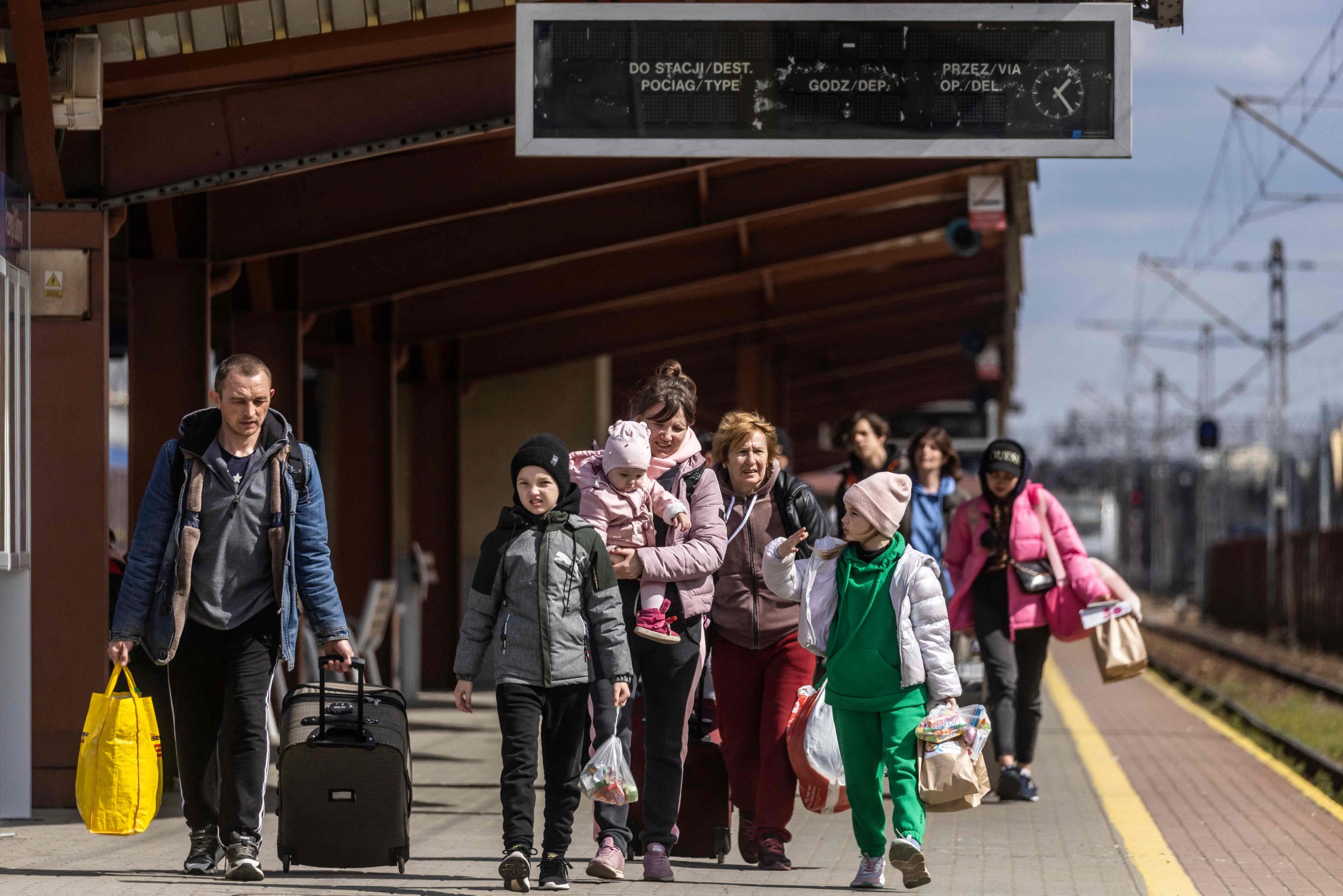
Millions of Ukrainians fled to Poland after Russia invaded their country earlier this year. Photo: Wojtek Radwanski / AFP / picturedesk.com
Towards the Ukrainians however, allies in the confrontation with the historic Russian enemy, there is no overt hostility. “These people came to us from a war-torn country,” Bąkiewicz said, striking a paternalistic note. “It’s not the time to think about trivial, materialistic things.” But the Polish clergy, in his view, was once again at fault – it had missed an opportunity to bring the Ukrainians, most of whom follow a branch of the Eastern Orthodox church, within the fold of the Catholic faith. “I am disappointed that the Polish Church is not fighting for these souls,” Bąkiewicz said. Converting Ukrainian refugees to Catholicism could, he argued, serve a dual purpose: it would create a durable bond between the two countries and it would boost the strength of the Polish Church.
The proposed mass conversion of a displaced people may sound like anachronistic fantasy – something out of Europe’s mediaeval past – but it encapsulates a particular view of faith and nation on the far-right. Some refugees are welcome, in this view, if they can be assimilated into the faith, reinforcing rather than altering it.
According to the traditionalists, it is the willingness of the Church to be altered, to change with the times, that lies at the heart of its current malaise. Under Pope Francis, the Vatican has softened its rhetoric towards LGBT minorities, condemned Europe’s policy towards migrants, and sought to find common ground with the leaders of other faiths. “If the Pope suggests that all religions are equal,” Bąkiewicz said, “it means that the Catholic martyrs, those who were put to death because they refused to convert, would have died in vain.”
Despite their many vocal objections to the current Pope, the traditionalists maintain that they have not crossed the line into outright defiance of papal authority – a move that would call their identity as Catholics into question. One of Bąkiewicz’s ideological soulmates in Polish politics, Robert Winnicki, threads the needle between criticism and defiance of the Pope. “We are not going to fight the Pope or the bishops who follow that liberal, syncretic, multicultural path,” said the MP from the ultra-conservative Confederation Party. “We just shrug our shoulders and do what is ours to do.” At the same time, he paints a bleak picture of the Church in peril. “The ship is sinking and the lifeboats are being lowered,” he said. “The Latin mass movement is one of those lifeboats. It will not operate against the Vatican, but despite it.”
First published on 9 December 2022 on Reportingdemocracy.org, a journalistic platform run by the Balkan Investigative Reporting Network.
This text is protected by copyright: © Mateusz Mazzini / Reporting Democracy. If you are interested in republication, please contact the editorial team. Editing by Neil Arun. It was produced as part of the Fellowship for Journalistic Excellence, supported by the ERSTE Foundation, in cooperation with the Balkan Investigative Reporting Network. Copyright information on pictures, graphics and videos are noted directly at the illustrations or on top of the article. Cover picture: Illustration: Sanja Pantic / BIRN
Fellowship for Journalistic Excellence
Since 2007, this fellowship programme has been providing financial and editorial support to journalists who have good ideas for cross-border reports. Tutors support the writing process to enhance the journalistic skills and knowledge of the fellows.
Each year, a jury selects ten experienced journalists from Albania, Bosnia and Herzegovina, Bulgaria, Croatia, the Czech Republic, Greece, Hungary, Kosovo, Moldova, Montenegro, North Macedonia, Poland, Romania, Serbia and Slovakia. The three best articles are awarded a prize at the end and – along with the other articles – published in numerous high-quality media outlets.
The Balkan Investigative Reporting Network (BIRN) and ERSTE Foundation set up the Fellowship for Journalistic Excellence programme in 2007 with a mission to encourage professional, in-depth, cross-border reporting in Southeast Europe.
